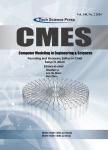An Efficient Differential Evolution for Truss Sizing Optimization Using AdaBoost Classifier
作者机构:Hanoi University of Civil EngineeringHanoi100000Vietnam
出 版 物:《Computer Modeling in Engineering & Sciences》 (工程与科学中的计算机建模(英文))
年 卷 期:2023年第134卷第1期
页 面:429-458页
核心收录:
学科分类:08[工学] 080203[工学-机械设计及理论] 0802[工学-机械工程]
基 金:funded by Hanoi University of Civil Engineering(HUCE)in Project Code 35-2021/KHXD-TD
主 题:Structural optimization machine learning surrogate model differential evolution AdaBoost classifier
摘 要:Design constraints verification is the most computationally expensive task in evolutionary structural optimization due to a large number of structural analyses thatmust be *** a surrogatemodel to approximate the behavior of structures instead of the exact structural analyses is a possible solution to tackle this ***,most existing surrogate models have been designed based on regression *** paper proposes a novel method,called CaDE,which adopts a machine learning classification technique for enhancing the performance of the Differential Evolution(DE)*** proposed method is separated into two *** the first optimization stage,the original DE is implemented as usual,but all individuals produced in this phase are stored as inputs of the training *** on design constraints verification,these individuals are labeled as“safeor“unsafeand their labels are saved as outputs of the training *** collecting enough data,an AdaBoost model is trained to evaluate the safety state of *** model is then used in the second stage to preliminarily assess new individuals,and unpromising ones are rejected without checking design *** method reduces unnecessary structural analyses,thereby shortens the optimization *** benchmark truss sizing optimization problems are solved using the proposed method to demonstrate its *** obtained results show that the CaDE finds good optimal designs with less structural analyses in comparison with the original DE and four other DE *** reduction rate of five examples ranges from 18 to over 50%.Moreover,the proposed method is applied to a real-size transmission tower design problem to exhibit its applicability in practice.



